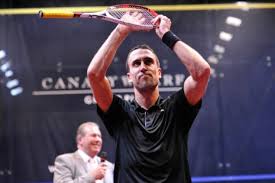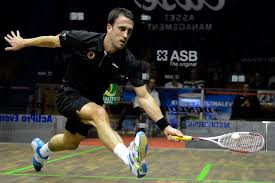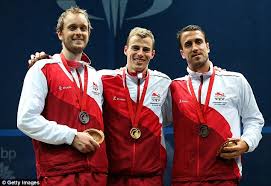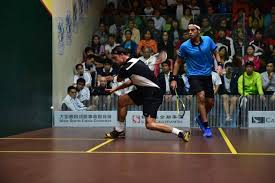Rod Gilmour of Squash Player Magazine talks to Essex professional Peter Barker about his new role with England Squash following his retirement from the PSA World Tour
With a fashionable overnight bag slung over his shoulder, wearing a tracksuit and red puffer jacket, Peter Barker walks into a Euston hotel looking set for yet another trip. Except this one is different.
Since the beginning of 2016, Barker’s name has vanished from the PSA World Rankings. There is little sentimentality in squash and there will be no farewell tournament. “That’s the beauty of it; it’s ‘see you later’ and on to the next generation,” Barker says as he reflects on a 13-year career on the PSA World Tour and the next chapter in his life.
Still only 32, the Londoner is likely to be the first of four England stalwarts to retire in the next few years. He reached a career-high fifth in the world rankings in 2012, a period which saw the methodical left-hander reach every quarter-final or better for nearly two years, brought him 16 PSA titles and three Commonwealth medals. Injuries then started to take their toll, with niggles requiring longer to get over.
“There was a time when I started looking over my shoulder instead of up and that speaks volumes,” he says. “Growing up – and maybe this was bravado talk – if I ever thought I was going backwards, then I said I’d be out. My ultimate would have been going all the way to no.1 and then to retire in the first month of doing it. I would love to have done that.
“But I’ve had to take breaks. I’ve come home crying thinking ‘I don’t want to do this any more’. I’ve come back thinking ‘this is the best thing in the world’. It is such an emotionally draining journey.”
All this was when he was enjoying life in the world’s top 10 (nearly seven years in all). But as life on tour in 2015 became “boring”, he mulled over a heads-up nudge from his sister, an air hostess for Virgin Atlantic, that the airline was going to open up a sponsorship pilot scheme.
Barker took it seriously. He was one of 10,000 applicants and went through a series of interviews and an open day in Southampton involving testing, maps, simulation and team-building. He says: “It made me realise it was something I didn’t really want to do. But if I had been offered it, I would have taken it, as it’s a once-in-a-lifetime opportunity, though I had to spend a year away from my family.”
 He eventually got down to the last 30, with only six places offered. “My wife was quite keen for me to be at home, to be honest,” he recalls. As his persistent knee injury began to take hold and several first-round exits in the autumn ensued, he instead talked through his retirement with England Squash.
He eventually got down to the last 30, with only six places offered. “My wife was quite keen for me to be at home, to be honest,” he recalls. As his persistent knee injury began to take hold and several first-round exits in the autumn ensued, he instead talked through his retirement with England Squash.
He did not expect the subsequent offer from Keir Worth, England Squash’s chief executive, to become an ES performance consultant, which initially encompasses around 10 days per month. “The idea of a proper job was pretty terrifying,” smiles Barker, who will now take his level 1-3 coaching qualifications.
“I thought it might be a good transition. I’d love to stay in squash, but I didn’t think it was financially possible.” Barker will be one of the first ex-players to be offered a job since Peter Nicol left his consultancy role a few years ago.
He admits: “There have been some good players who have come and gone, and not stayed on in a coaching capacity. I was quite taken back and honoured. “We are products of England Squash. They have supported me and been part of the system since the day I turned pro. It is an intense sport and I’ve admired those players who’ve walked away. I always thought I would be one of those who would do something differently.”
Barker will help blood the next generation of players and work with the ES Academy players, like George Parker, Richie Fallows and Angus Gillams. As someone who took his training seriously and who never overstepped the line, Barker’s appointment is a shrewd one, not least because of his views on the current state of the game.
“I would like to shake things up, as the transition to being a world-class player is too slow,” he says. “I will be looking at what the younger players are doing day in day out, both on and off court.
“Over the years we’ve been told what to do and haven’t been monitored that closely. It’s a tough game and if you want to be the best, you have to work harder than the rest.
“If I’m not the fittest I can be, then I’m not that good. That was such a big part of my game. Having a family also changes you. They are different motivations and when I started out, it was about me.
“Now, you just have to want it and if you can’t match the Egyptians’ hunger, then you literally have no chance. Ultimately, that’s the point I want to portray, because the margins are so fine.
“They have a chance, but they have to change a few things. There is almost a fantasy about being a professional, which I see more in the English guys than any other country.”
Ironically, Barker’s last game was against Egypt’s Mohamed Elshorbagy, the British Open champion, in December’s Hong Kong Open.
“I really enjoyed it,” he said. “When he first came on the scene, he thought he could beat up anyone. But he has come on in those years and is a very respectful player. In a way I was pleased to bow out to a world no.1. It wasn’t an anti-climax. He’s a great example of power and fitness, and how to get to the top. He takes time away from opponents and that’s the way the game is going.”
As befits Barker’s demeanour, he went out for a meal and flew home the next morning. No fanfare. He will be missed on tour, though, and in a team environment. “Playing for England was always enjoyable,” he commented. “It wasn’t about playing for your country per se, but it was about the people who were sitting in the background. I racked up 100 England caps and it’s one of my proudest achievements.”
He will miss best friend Daryl Selby too. For the last 10 years they have shared rooms at tournaments. “But when your body is slower than your mind, you know it’s time to think about something else,” he says. “The last year I found pretty boring. It wasn’t fun.”
We will still miss how he was able to smash his racket on the back of those calves. His laugh echoes in the hotel foyer. “I wore my heart on my sleeve and I guess I am emotional,” he explains. “I used it to have a release and then focus again.”
The next chapter looms and the Manchester train to England Squash headquarters beckons. Time to instil some passion into that next generation. “I don’t want to be an ex-squash player who had regrets. I can hold my head up high and move on,” he concludes. “It’s been an honour and the sport doesn’t owe me a thing.”



